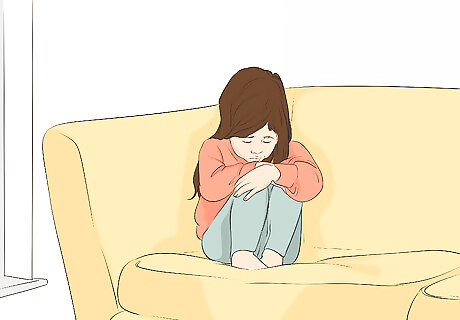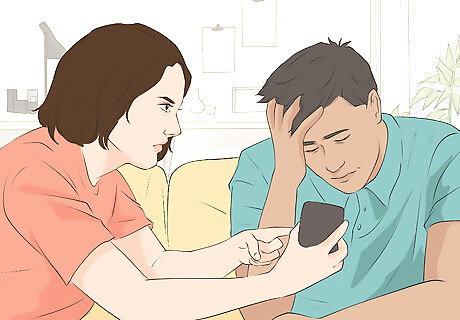
views
- Self-sabotaging relationships occur when one partner sets out to destroy the relationship consciously or subconsciously.
- Self-sabotaging behavior is often an after-effect of childhood trauma, past experiences, or relationship fears.
- If someone’s self-sabotaging their relationship, they may be overly critical of their partner, have low self-esteem, and/or avoid controversial discussion.
What is self-sabotaging in a relationship?

In a relationship, self-sabotaging is when someone avoids connecting with a partner. This behavior can be conscious or subconscious, but the self-sabotager often has no idea they’re pushing their partner away. Perhaps they inwardly want to breakup or are insecure about where they stand with their partner. Either way, their closed off behavior can cause the relationship to end prematurely. Self-sabotaging relationships usually stem from poor communication skills, past experiences, and/or trust issues. This behavior can look like avoiding texts from your partner, canceling dates repeatedly, or being overly critical of their appearance or behavior. More often than not, self-sabotaging is a form of protection. Those who self-sabotage are scared of vulnerability or loss, so they’ll put up a critical wall to avoid heartache.
What causes self-sabotaging behavior?

Childhood trauma One of the leading causes of self-sabotaging behavior in relationships is past experiences or trauma. If you were raised in a toxic household or were emotionally or physically abused, you’re more prone to self-sabotaging behaviors. You may struggle to trust others (even those closest to you) because of your past, and because of this, you could subconsciously push a partner away. Talk to a therapist or counselor about past traumas to move forward. They’ll be able to help you work through your emotions and find peace.

Fear of abandonment Do you fear losing your loved ones or relationships? Is being alone a constant worry? If so, you may have a fear of abandonment or rejection. Fear of abandonment stems from the worry that you’ll be left alone when you’re the most vulnerable. Although you want to stay in your relationship, you may unintentionally push your partner away by constantly being by their side. Work on communicating your wants and needs with your partner. Let them know how you feel, and you can overcome your fears together. Not sure if you have a fear of abandonment? Take our “Abandonment Issues Quiz” to find out.

Poor self-esteem If you think negatively about yourself, you’re more likely to practice self-sabotaging behavior. In your mind, you’re not worthy of love, so why should your partner want you? This mindset not only hurts your self-image, but it can also lead to conscious sabotaging behavior, such as purposefully forgetting a date because you believe your partner shouldn’t want to be seen with someone like you. Improve your self-esteem by reframing negative thoughts. For instance, change the thought, “I’m just not good enough for them,” to “I’m not perfect, but no one is. They chose me for a reason.”

Learned behavior More often than not, people mimic the behavior they’ve learned throughout their lives. You may unintentionally mirror the same behavior if you’ve only ever experienced hostile or toxic relationships (whether through your family or personal relationships). This isn’t your fault—you’re simply practicing what you know; it’s familiar—but it can be harmful to you and your partner. Identify the behavior you want to change in yourself to work on reversing it. What are you doing that you’ve seen or disapproved of in your past?
7 Signs of Self-Sabotaging in Relationships

Gaslighting Do you often question your partner’s feelings? If so, you may be unintentionally gaslighting them and self-sabotaging. Gaslighting is a type of emotional abuse that makes someone question their reality. Let’s say your partner says, “I’m upset you can’t come to the banquet tonight,” you respond with, “You’re not really upset. It’s your fault you told me last minute, so now you’re blaming me.” With this response, you’re invalidating your partner’s feelings, which could result in an argument. Stop gaslighting behavior by actively listening to your partner and doing your best to understand their position.

Excessive criticism Do you always make a point to tell your partner when you disapprove of their outfit, behavior, or attitude? If so, you could be self-sabotaging the relationship. Criticism isn’t abnormal in relationships, but excessive criticism is. No matter what your partner does, it just doesn’t seem good enough for you. Rather than noting everything wrong with your partner, note what’s right. Don’t forget to compliment them every once and a while!

Topic avoidance Are you constantly dodging difficult conversations with your partner? Poor communication and avoiding decisive discussions could be a sign that you’re self-sabotaging. You don’t want to talk about anything that could divide you as a couple. You’d rather pretend you’re in sync to live out your perfect relationship fantasies. Communicate better in your relationship by practicing active listening and not being afraid to share your opinion. Everyone has different opinions, and your ideal partner should be able to recognize that.

Infidelity Cheating or serial dating is often a sign of self-sabotage in relationships. Do you find yourself hooking up with others while you’re steady with someone else? Are you known as the “player” of your friend circle? If so, you may be self-sabotaging your relationships. You don’t necessarily want to be a player, but you struggle to find someone to commit to. Take some time to evaluate what you want and need in a relationship. What’s holding you back? What does the ideal candidate need to do for you to be happy?

Low self-esteem Do you often question your worth around your partner? Are negative thoughts constantly invading your mind? If so, you may be inadvertently sabotaging your relationship. Low self-esteem can cause you to question the strength of your relationship and yourself. If you don’t believe in yourself, how can you believe in the relationship? Replace self-deprecating thoughts with positive ones to boost your self-esteem. For instance, instead of thinking, “I’m an idiot. What are they with me?” think, “I may not be as smart as others, but I am strong in other ways. My partner is lucky to have me.”

Trust issues If you have a hard time trusting your partner, you may be more likely to self-sabotage the relationship. Perhaps you’ve experienced infidelity or other toxic relationship behavior in the past. Either way, past relationships have made it difficult to trust. While this isn’t entirely your fault, a lack of trust can hinder communication and instigate self-sabotaging and anxiety-ridden behaviors. Work on being honest with your partner and trusting their word. Trust doesn’t come easily, but the more open-minded you are, the more likely your relationship will last.

Jealousy Are you constantly worried about what your partner is doing when you’re not around? Jealousy is normal in relationships—it happens—but being excessively jealous and controlling isn’t. Chances are that if you fret over every person your partner texts, hangs out with, or looks at, you’re self-sabotaging. Set boundaries with your partner to establish trust. Express to them what you both can and can’t do in the relationship.
How to Stop Self-Sabotaging Your Relationship

Discover your attachment style. In relationships, attachment theory explains how you react and respond to intimacy based on your upbringing and past experiences. Identifying your attachment style you have can help you understand why you self-sabotage your relationships. There are 4 types of attachment styles: secure attachment, ambivalent attachment, avoidant-dismissive attachment, and disorganized attachment. Learn your attachment style by asking yourself these questions: What did I learn about emotions from my family? Who do I turn to in times of need? Did I have a dependable parental figure growing up? Do I ask for what I need? How do I receive love? How do I show or give love? What causes the most discomfort in my relationships?

Take responsibility. Unfortunately, the only one responsible for self-sabotaging behavior is you. While past experiences and traumas can affect how you act, the behavior is ultimately your own doing. We know it’s hard, but recognizing, acknowledging, accepting, and taking responsibility for your actions is the first step toward healing. Try journaling to process your emotions. Write whatever comes to mind—you may be surprised by what you learn about yourself. Be open and honest with your partner about your past (as long as you’re comfortable doing so), or talk to a therapist to help you come to terms with past traumatic experiences.

Identify your triggers. Once you’ve recognized that you’re self-sabotaging your relationship (whether consciously or subconsciously), work on discovering why. Why are you pushing your partner away? Why have you withdrawn from the relationship? Understanding what triggers you to revert or cope with self-sabotaging behaviors can help you find healthier ways to express your emotions. Answer these questions to identify your triggers: Are there certain places I feel on edge? Do I lash out when my partner expresses a specific need or emotion? What conversation topics do I avoid with my partner? When do I feel uncomfortable in my relationship?

Consider ending the relationship. Sometimes the best way to avoid self-sabotaging is to let go of the relationship. If you’ve minimized your destructive habits, acknowledged your behavior, come to terms with your past, and still aren’t happy, it may be time to end things. Self-sabotaging behavior is a sign that you’re subconsciously unhappy or dissatisfied in the relationship, so don’t be afraid to close this chapter and start the next. Knowing when to end a relationship is never easy, so carefully weigh your options. Make a pros and cons list if you’re feeling stuck to visualize your thought process.




















Comments
0 comment